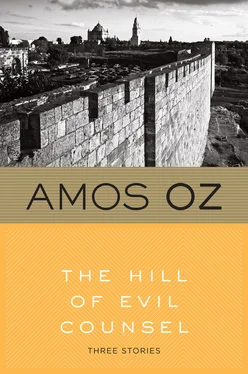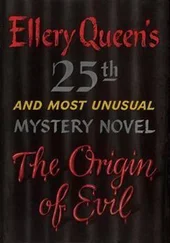They are sitting on their balcony as I write, Kolodny the printer, his wife, his sister, Natalia, and our mutual neighbor the poet Nehamkin from the radio repair shop. They are surrounded by geraniums in cans and cacti growing in boxes of earth. Where is the child? I implore you to watch out for the child, in case he takes it into his head to sneak into the Schneller Barracks and launch a single-handed raid on the British army. I cannot see Uri. And they seem so unperturbed, sitting there chatting, talking about politics, I expect, apparently calm. I consider their calmness nothing short of outrageous. Above their heads there is a yellow light bulb around which the insects are swarming dementedly. Kolodny the printer is a pale-faced, equable man, yet even he for some reason chooses to dress in what is almost a military uniform: wide khaki shorts, a brass-buckled belt, long khaki socks held up just below the knees by garters. The poet Nehamkin, on the other hand, is wearing his habitual Polish suit and silk tie: ready at a moment's notice. It seems to me that with the exception of us two, everyone in the neighborhood is more or less a pioneering type. They are all positive, constructive characters, apparently incapable of panic. And death is not a possibility. They are chatting. Laughing, Mrs. Kolodny passes around a bowl of oranges, but nobody takes one, and she smiles distractedly. What is transitory in Jerusalem and what is permanent. What will Uri look back to nostalgically in times to come. Corrugated-iron sheds. Plywood partitions. Empty yogurt pots. European manners blended with a certain crude gaiety. A city of immigrants on the edge of the desert whose flat rooftops are all festooned with drying sheets. The inhabitants are always scurrying from place to place with sunglasses pushed up on their foreheads. A general expression of "I'm very busy but I'll stop a moment just for you." An expression of "Business calls." An expression of "Sorry, we'll have a nice long chat some other time, but right now I must dash, we all have to do our duty."
I am not complaining, Mina. These are crucial times, and soon there will be a war. Everybody, even a man like me, must do his best to make his modest contribution to the general effort. Perhaps it is true that this is the last generation to live in chains. But is it really the last generation. Is it true that different times will come that I shall not know.
Only the women, it seems to me, are not strong enough: Iin ing up for rice, lining up for ice, waiting beside the kerosene cart, they seem to be on the point of fainting. And at times on summer afternoons, when Jerusalem is ablaze, swept by the desert light, I can hear Mrs. Kolodny playing her piano behind her shuttered windows, and it sounds like a desperate moan.
So the British will leave. The King David Hotel in Julian's Way will be emptied of its officers with their greased, neatly parted hair, emptied of its weary Englishwomen who sit on the hotel terrace looking out over the walls of the Old City as if fishing on the banks of the biblical past. No more morning sessions under the picture of the King in Edward O'Leary's office, where Dr. Mahdi from the Arab Council and Dr. Nussbaum from the Hadassah Hospital discuss ways of protecting the city's water supply from bacteria or destroying the breeding grounds of the mosquitoes in the Kedron Valley. Different times will come. "Excellent people like yourselves," says Dr. Mahdi, "such an intelligent, enlightened community, how have you all come to be captivated by such a terrible idea as Zionism?" I try my best: "For heaven's sake, Antoine, make an effort, just for once, try to see things from our point of view." And Edward, as always, firmly: "Gentlemen, perhaps we had better. Let's get back to the business at hand, if you don't mind."
What is the business at hand, Mina, my dear?
Perhaps you know?
Pitch-black outside. Crickets. Stars. Wind. I shall stop now.
Early hours of Wednesday morning
September 10
Dear Mina,
I shall not use the word "blame." You are not to blame for what you do to me in my dreams. But perhaps you are responsible, up to a point.
With a hint of a gray mustache, a smell of cigarette smoke emanating even from your hair, wearing army trousers and a large man's shirt with several pockets, you stand beside my bed. Antoine is feeling my Adam's apple; he is clasping my chin in both hands, to keep me from wriggling during the operation. His polite face is so close to mine that I can see a yellow boil with a pink rim on his nose. A slight asymmetry between the two wings of his mustache. He is chubby and well mannered, and he smells of eau de cologne as he smiles at me. "There, there," he says in English; "let's both try together," he says. Two strong young men are holding my legs above the knees, but apparently their minds are not on the operation, because they are whispering to each other and chuckling. You are holding out a scalpel, or perhaps it is not a scalpel but a kitchen knife, a bread knife. Samovar thanks you in his usual way, with a slight bow, and takes it from you. "Slowly," you tell him. "With him there's no need for you to hurry." "There." "Now there." "And here." He does exactly what you say. He is wearing rubber gloves. He is a bright crimson. And he cuts amazingly gently. I must try to say something, at once, before my head is severed from my neck. Perhaps I shall remind Antoine how he came to see me late one night last winter, and begged me to cure him of a dose of gonorrhea that he had apparently contracted on his last trip to Beirut. And how I put him up here in my apartment for four days and gave him injections. But I promised Antoine to carry his secret with me to the grave. 1 shall remain silent. How strange is the deepening cut in my throat: no blood, no pain. On the contrary, Relief. "That is all, Dr. Oswald," says Ben-Gurion, as if he cannot believe his eyes. "It is a very simple operation, after all." And I indicate with a movement of the lips that the meeting is now over.
I am awakened by heavy rain. The light refuses to come on: it would seem that there is a power failure in Jerusalem. I strike a match. Look at my watch. One o'clock. I must get up. Wind and rain at the window. This time it is the autumn rain at last. The insects that have been dancing around the balcony light in the evenings have been swept away. The pine trees and the stone are what has endured, washed clean of dust, purified by wind and water.
I must get dressed. I must go at once. Go where, Mina. The dead praise not the Lord. In New York, you have said, a neo-Viennese school is reassembling. You must be there to report on the collective recovery that is taking place in the hills of Galilee and the Jezreel Valley. On the beginning of the eclipse of centuries-old ethnic neuroses. There is a way, ladies and gentlemen, you will proclaim to those scholarly refugees, there is a way, and it lies open.
Will you tell them about me, too? Will you be able to use me at least as an example, a curiosity, a detail that sheds a certain light or casts a shadow on the new pioneering reality among those ancient hills?
I must go. Tonight. At once. Perhaps to Katamon, to knock on Antoine's door and implore him by everything that's holy. To plead with him. To plead for the lives of our children, his and mine. Or perhaps not to Katamon but to Haifa and the kibbutzim in the valley. Is it already too late? Are the wind and rain meant for me this time? The Schneller bell rings once, twice, and is silent. I am sitting writing to you by the light of a kerosense lamp, in my gray flannel dressing gown. I ought to get dressed and go. There is a way and it lies open. Happy is he who waits, says Mr. Nehamkin; he will surely reach his goal. He who waits will never reach his goal, my dear fellow: only those who travel ever reach their goal. What is that goal. There is a way and I must get up and go. Which is the way, Mina, that is what I do not know, but we have a son and he will be able to travel it. The man who is writing to you is tired and ill. He must give himself an injection, take his pills, and go quietly back to bed. Enough. The inscription on the parish church was in four languages in the Vienna of my childhood; in four languages it promised every man and woman that there is a way back. It is a lie, I tell you, a bald-faced lie.
Читать дальше











